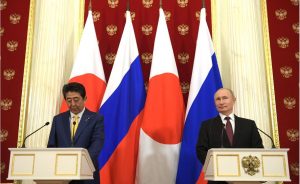Japan must now surely realize that trying to secure the return of the so-called Northern Territories from Russia is a fruitless quest and act accordingly. Never while Vladimir Putin is in power will Japan be able to achieve its decades-long ambition to secure the return of the southernmost Kuril Islands, which were formerly part of Hokkaido Prefecture. These were seized by Russia at the end of World War II. As the Russian military invasion of Ukraine has again illustrated so brutally, Putin is an imperialist bent on acquiring territory, not negotiating it away.
The new Kishida administration initially followed existing Japanese government policy by demonstrating a preparedness to continue exchanges with Russian leaders on the return of the Northern Territories. After the first signs of rapprochement in 2016 under former Prime Minister Abe Shinzo’s leadership, warming relations began in earnest in 2018 and accelerated in 2019. At that time, it was agreed that bilateral negotiations on the islands should be based on the 1956 Japan-Soviet Joint Declaration. This document was quite explicit in its referral to the transfer of what were formerly Hokkaido Prefecture’s Shikotan Island and the Habomai islets back to Japan after the conclusion of a peace treaty between the two countries. Even Putin himself had demonstrated a willingness to seek an early conclusion of a peace treaty by returning these islands, having officially recognized the validity of the 1956 declaration.
However, what looked like a possible breakthrough in 2019 resulting from Abe’s acceptance of the so-called “two-island” approach – abandoning Japan’s claim to Kunashiri and Etorofu islands in the Southern Kurils and accepting the return of only Shikotan and the Habomai islets – was simply Putin’s first step in a merry dance, on which he has led the Japanese government ever since. This has delivered nothing for Japan despite new concessions associated with Abe’s “economic cooperation” diplomacy, which reversed Japan’s long-standing position that economic and political relations with Russia could not be improved significantly until the Northern Territories were returned to Japan.
Abe’s eight-point economic cooperation plan included development aid, business partnership, and investment in the Russian-held islands overseen by the Minister for Economic Cooperation with Russia, a new position established in 2016. However, Japan was powerless to stop Russia’s increased militarization of the islands and a constitutional barrier to their return created in 2020.
In the actual negotiations on sovereignty, Putin also proved a slippery customer for the Abe government. When Putin first agreed in 2018 to move ahead with negotiations based on the 1956 Joint Declaration, he played word games by arguing that the declaration “said nothing” about which country would actually have subsequent jurisdiction over the islands. In short, Putin chose to interpret the meaning of “transfer” as not necessarily amounting to a change of national sovereignty. Foreign Minister Sergei Lavrov also demanded that Japan first acknowledge Russia’s sovereignty over the Northern Territories as a condition for negotiations to move forward, a condition that Japan rejected.
Even more seriously from Japan’s own national security perspective, Russia has continued to consolidate its military position in and territorial ownership over the Northern Territories ever since. Along with increased visits from high-ranking officials in the Russian government, government-organized protests against any surrender of national territory, and the holding of military exercises in the vicinity of the islands, the general process of Russian militarization of the islands has accelerated, not declined, since the increased diplomacy over the issue and despite closer bilateral economic ties. Moreover, to add insult to injury, Russia has just given names to three uninhabited and unnamed islands in the Habomai group.
Other parallels with the Ukraine issue are also striking insofar as Russia has treated the islands as a bargaining chip in trying to influence Japan’s security relationship with the United States. Putin’s extreme reluctance to cede any of the Northern Territories back to Japan has been justified in terms of his fear that Japan would allow the United States to build military bases there, including the deployment of a U.S. missile defense system, after the conclusion of a peace treaty. This is despite Japanese and U.S. government denials of any such intentions.
Putin has also raised the general issue of the U.S. military stationed in Japanese territory, including Okinawa, in the negotiations as well as setting the impossible condition that Japan had first to withdraw from its alliance with the United States in order to conclude a peace treaty with Russia. Clearly, Putin had no intention of ever handing over any of the contested territory and was “merely dangling the territorial issue as an enticing carrot in front of Mr. Abe” – as Professor Itsuro Nakamura put it in 2019 – in order to drive a wedge in the Japan-U.S. alliance.
Wisely, the Kishida government has put the territorial issue on hold and hardened its policy toward Russia in tandem with the acceleration of Russian military attacks on Ukraine. On the February 25, Kishida told the Japanese Diet, “For the time being, we must refrain from talking about territorial issues (with Russia),” acknowledging that it would be difficult to proceed with peace treaty negotiations following Russia’s invasion of Ukraine. As Kishida sees it, “We can no longer keep our relationship with Russia as we did before.”
The marked shift in its standpoint has freed up the Kishida administration to impose tough sanctions on Russia in line with the United States and European countries as well as coordinating with the G-7 on additional sanctions. Despite retaining the ministerial position in charge of economic cooperation with Russia, the Kishida government has also suspended ongoing economic cooperation projects and hardened its position on the return of the Northern Territories – describing them as Japan’s “inherent territories.”
































